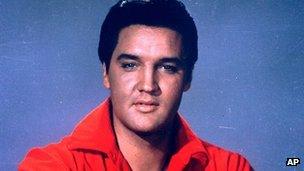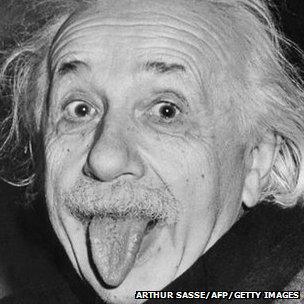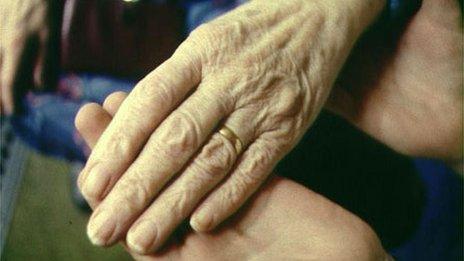Test of famous faces 'helps to spot early dementia'
- Published

Recognising "the King", Elvis Presley, would score points on the face test...
Asking patients to identify pictures of famous people, such as Elvis Presley and Diana, Princess of Wales, may help spot early dementia, say researchers.
Doctors currently use simple mental agility tests to screen for the disease, but US experts believe a face recognition test should be used too.
A small study in the journal Neurology found it could flag up the beginnings of one type of dementia in 30 patients.
Trials are needed to see if it works for other forms of the disease.
The research at Northwestern University in Chicago found that people with early onset primary progressive aphasia (PPA), a rare form of dementia, struggled to identify black and white prints of 20 famous people, including John F Kennedy, Albert Einstein and Martin Luther King.
Participants were given points for each face they could name. If they could not name the face, they were asked to identify the famous person through description instead.
'Lot of nuances'
Compared with 27 dementia-free volunteers, the 30 participants with PPA scored poorly on the famous face test.
While it is normal for anybody to forget a name or a face from time to time, failing to recognise someone as famous as Presley suggests there could be a deeper-rooted cause.
Brain scans of the participants with PPA revealed loss of brain tissue in areas that deal with recognising faces.
Tamar Gefen, lead author of the study, said it would be useful to add the test to the others that doctors use to spot early dementia.

... as would correctly identifying Albert Einstein
She said: "It could be incorporated into a battery of tests for dementia. There are a lot of nuances and differences in dementia so it is good to use different tests."
Doctors already screen by asking questions such as "What month and season is it?"
The celebrity test would need to be adapted for the individual. Someone aged 45 might not be expected to recognise film stars from the 1930s, and a patient in their eighties might not be familiar with current pop stars, for example.
Dr Marie Janson, of Alzheimer's Research UK, said: "It's important to be able to give an accurate diagnosis for people with dementia so they can gain access to the right care and treatments, but the different forms of dementia can be difficult to identify.
"Studies such as this could increase our understanding of the way the brain is affected by different forms of dementia, but we must invest in research if results like these are to be used to move towards better diagnosis."
A spokeswoman for the Alzheimer's Society said: "Tests like this could help identify rarer forms of dementia which might otherwise be overlooked.
"However, problems with facial recognition are not a symptom of all types of dementia, so more research is needed to see whether adaptations of this approach could have wider use."
- Published15 May 2013

- Published8 August 2013
